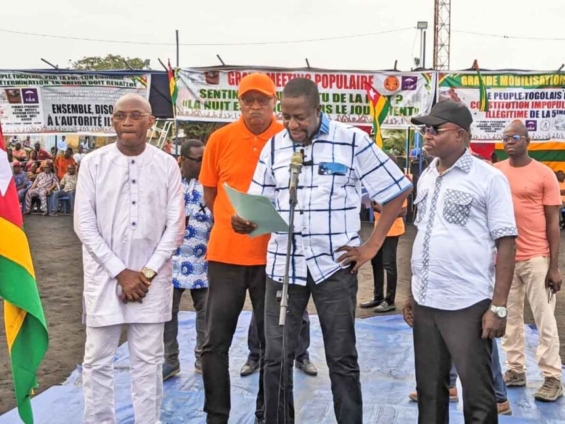Hundreds of militants from radical Togolese opposition parties—including the National Alliance for Change (ANC), led by Jean-Pierre Fabre, and the Democratic Forces for the Republic (FDR), both parliamentary parties—alongside several civil society organisations, gathered at a rally on Sunday, 4th May, in the Togolese capital to denounce what they described as a forced transition to a parliamentary system.
This shift, they argued, was orchestrated by the regime of President Faure Gnassingbé, who has now become the de facto Chairman of the Council of Ministers.
President Gnassingbé was designated and endorsed as Chairman of the Council of Ministers under the new parliamentary arrangement on 3 May 2025 by a parliament dominated by the ruling Union for the Republic (UNIR) party, composed of members of the National Assembly and the newly established Senate.
According to the radical opposition, the move from a presidential to a parliamentary system—undertaken without a national referendum—constitutes an authoritarian strategy designed to extend Faure Gnassingbé’s grip on power beyond the expiration of his term, which officially ended on 3 May.
His term followed the 2020 elections conducted under the 2019 Constitution, which had imposed term limits.
“Yesterday, Saturday 3rd May, the constitutional coup was completed with the appointment and endorsement of the Chairman of the Council of Ministers and the President of the Republic. Our reaction remains unchanged. From the onset of this scandalous process, it has been an imposture and a betrayal. We shall never abandon our struggle in the face of this constitutional coup d’état,” stated Jean-Pierre Fabre, leader of the ANC and one of the most prominent figures in the Togolese opposition.
The opposition parties and allied civil society organisations also criticised Jean Lucien Sanvi de Tove, an 85-year-old veteran opposition leader and founding member of the smaller Pan-African People’s Convergence (CPP), for accepting the largely ceremonial role of President of the Republic despite widespread public discontent over the systemic shift.
“He is ill and at death’s door, yet they brought him back to suddenly become President of Togo. It’s absurd. Mr Sanvi de Tove disappeared from the political scene decades ago—young people today don’t even know who he is.
To deceive the international community into believing there is consensus around this imposed parliamentary system, Faure Gnassingbé’s regime has resorted to installing an elderly figure who briefly joined the government in 2009 and has since remained absent from politics,” declared Paul Dodzi Apevon, leader of the FDR.
Togolese opposition parties and civil society groups are planning a large-scale demonstration on 17th May to protest what they describe as a flagrant attempt to entrench Faure Gnassingbé’s hold on power.
Many political analysts predict that the authorities are likely to prohibit any gatherings deemed critical of the new regime.
It is worth recalling that Togo will no longer hold presidential elections, having transitioned from a presidential to a parliamentary system following the adoption of a new constitution in April last year.
Under the new arrangement, the Chairman of the Council of Ministers will serve a six-year term, renewable indefinitely, provided the ruling party maintains a parliamentary majority.
This provision effectively removes the previous two-term, five-year limit stipulated in the 2019 Constitution—a reform that had emerged from widespread public protests.
The Chairman of the Council of Ministers will wield all executive powers to govern the country, while the President of the Republic—elected for a renewable four-year term—will serve a ceremonial role.
Togo is scheduled to hold local elections in July this year to elect mayors and municipal councillors.
ALSO READ:



